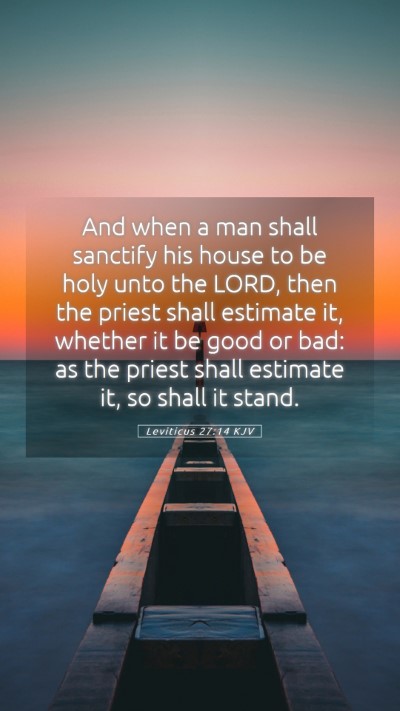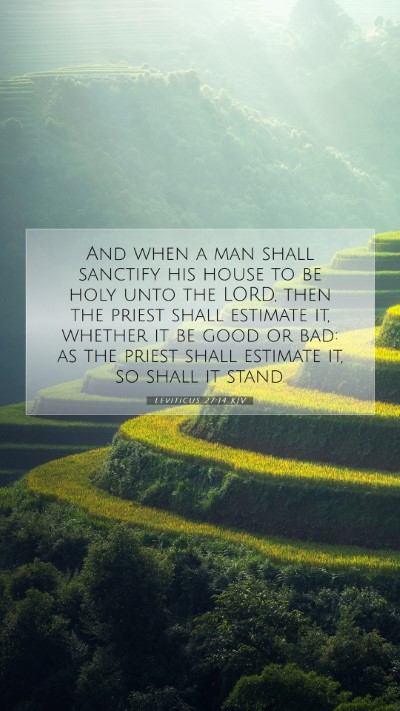Bible Verse Study: Leviticus 27:14
Verse: Leviticus 27:14 - "And when a man shall sanctify his house to be holy unto the LORD, then the priest shall estimate it, whether it be good or bad: as the priest shall estimate it, so shall it stand."
Understanding the Context of Leviticus 27:14
The Book of Leviticus focuses on the laws and regulations for the Israelites, emphasizing holiness and proper conduct in worship. Chapter 27 specifically deals with the valuation of offerings and vows, presenting guidelines for dedicating property or persons to God.
Bible Verse Meaning
This verse highlights the process of dedicating one's property to God and the role of the priest in determining its value. The underlying significance pertains to how individuals express their devotion to God through tangible means.
Insights from Public Domain Commentaries
-
Matthew Henry:
Henry emphasizes that when a man dedicates his house to God, it is an expression of commitment and faith. The valuation by the priest indicates God's involvement in the process, as the priest represents divine authority. This reflects the principle that all things belong to God, and individuals are merely stewards of their possessions.
-
Albert Barnes:
Barnes points out the importance of the priest's role in the valuation process. The assessment serves not just a financial purpose but also a spiritual one. It reminds the people that their possessions should be surrendered to God’s purposes and that proper valuation is essential to maintaining integrity in their vows to God.
-
Adam Clarke:
Clarke elaborates that the sanctification of a house involves acknowledging it as a gift from God. The valuation process symbolizes a surrender of control over personal property, letting individuals recognize God's sovereignty over all aspects of life. The priest's estimation allows for a structured approach to devotion, underscoring the importance of accountability in spiritual commitments.
Key Themes and Applications
The central themes of Leviticus 27:14 resonate with contemporary readers as they explore the meaning of commitment, stewardship, and accountability in their spiritual lives. This verse encourages believers to reflect on how they dedicate their own resources to God.
1. Commitment to God
Devotion goes beyond mere words; it involves actions and choices that reflect a heart directed towards God. Dedicating property signifies a seriousness in one's faith.
2. Stewardship of Resources
This verse serves as a reminder that all possessions belong to God. Individuals are called to manage their resources wisely and for divine purposes.
3. Accountability in Spiritual Matters
The requirement for a priest's estimation highlights the importance of accountability in spiritual commitments, urging adherents to value honesty and integrity.
Cross References
- Exodus 30:14 - Concerning the sanctification of offerings.
- Numbers 18:14 - Regarding dedicated things belonging to the Lord.
- Matthew 6:19-21 - Teachings on treasures in relation to God's kingdom.
Conclusion
In summary, Leviticus 27:14 provides valuable insights into the nature of dedication to God, emphasizing the roles of commitment, stewardship, and accountability as essential components of faith. Engaging with this verse offers profound opportunities for believers to explore their relationships with God in terms of resource management and spiritual integrity.
Further Study Recommendations
If you wish to delve deeper into the significance of Leviticus 27:14 and related topics, consider joining Bible study groups or utilizing Bible study tools and resources to enhance your understanding of Scripture.


